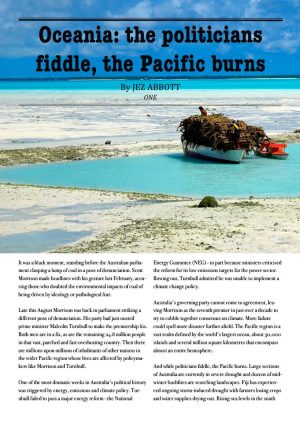 It was a black moment, standing before the Australian parliament clasping a lump of coal in a pose of denunciation. Scott Morrison made headlines with his gesture last February, accusing those who doubted the environmental impacts of coal of being driven by ideology or pathological fear.
It was a black moment, standing before the Australian parliament clasping a lump of coal in a pose of denunciation. Scott Morrison made headlines with his gesture last February, accusing those who doubted the environmental impacts of coal of being driven by ideology or pathological fear.
Late this August Morrison was back in parliament striking a different pose of denunciation. His party had just ousted prime minister Malcolm Turnbull to make the premiership his. Both men are in a fix, as are the remaining 24.8 million people in that vast, parched and fast-overheating country. Then there are millions upon millions of inhabitants of other nations in the wider Pacific region whose lives are affected by policymakers like Morrison and Turnbull.
One of the most dramatic weeks in Australia’s political history was triggered by energy, emissions and climate policy. Turnbull failed to pass a major energy reform – the National Energy Guarantee (NEG) – in part because ministers criticised the reform for its low emissions targets for the power sector. Bowing out, Turnbull admitted he was unable to implement a climate change policy.
Australia’s governing party cannot come to agreement, leaving Morrison as the seventh premier in just over a decade to try to cobble together consensus on climate. More failure could spell more disaster further afield. The Pacific region is a vast realm defined by the world’s largest ocean, about 30,000 islands and several million square kilometres that encompass almost an entire hemisphere.
And while politicians fiddle, the Pacific burns. Large sections of Australia are currently in severe drought and dozens of mid-winter bushfires are scorching landscapes. Fiji has experienced ongoing storm-induced drought with farmers losing crops and water supplies drying out. Rising sea levels in the south Pacific are forcing some of Solomon Islands’ 560,000 population to leave their homes.
Quibbling in Australia and other national parliaments is matched by confusion at ground level. John Kaia, chief of the Aenabaolo tribe, can only watch as the changing climate plays havoc on his isle of Tauba in the Solomon Islands: “Before, we used to know the seasons, but now the wind, the rain, the cyclones can come at any time,” he told Germany’s DW website. “We don’t know when.”
And while the tide rises in the Pacific, the tide of data grows evermore alarming in its forecasting. According to a report published by the UK government this May, all emerging evidence points to vast differences in impacts in a 1.5˚C world, compared to the 3˚C world to which our current policies and climate change pledges are leading us.
“For Pacific islands and marine and coastal ecosystems in the region, these differences cannot be overstated,” the report explains. “Even a 0.5˚C difference may mean critical tipping points are crossed.” Some of the most critical impacts for marine and coastal ecosystems and communities in the region include this one: at 2˚C global sea levels could rise by about 50cm by 2100.
Also at 2˚C virtually all coral reefs in the region may be lost (98% loss) with severe implications for biodiversity and island communities, economies and cultures. Reef degradation at 1.5˚C is still catastrophic (90%), while ocean acidification will impact upon reefs, fisheries and biodiversity with knock-on impacts for communities and economies.
This puts frustrated policies such as the NEG into painful focus. Its failure to factor in climate change will cost Pacific neighbours dearly, insists Oxfam Australia chief executive Dr Helen Szoke. And right on cue – as ONE went to press – typhoon Jebi was causing chaos thousands of miles away in Japan, battering towns, killing people, tossing oil tankers and forcing the of grounding flights.
“As political leaders from across Australia meet to determine the fate of the nation’s embattled energy policy, they must be under no illusion how its backwardness on climate change is perceived by our Pacific island neighbours,” Dr Szoke told ABC news channel. “No region is at greater risk to the dangers of climate change than the Pacific.”
She insists debate on climate and energy policy in Australia has become divorced from the escalating impacts of climate change worldwide. If Australia is to maintain its position as a trusted partner of Pacific island nations amid growing competition in the region, it must demonstrate it is serious about the “number-one threat” to the the Pacific peoples: climate change.
A good place to get serious was the Pacific Islands Forum in September. The intergovernmental group is held every year between 18 countries from across the Pacific – the smallest member country is Niue with a population of 1,600, and the largest is climate-quibbling Australia. The forum launched in 1971 to enhance the economic and social wellbeing in people across the region.
According to reports before the event, hosted this year by the tiny island of Nauru, Pacific countries were looking at setting up a huge climate change fund by pooling resources to amass a $1.5 billion cash pot. Nations could dip into the money to build infrastructure to brace themselves for disaster instead of waiting for it to happen and then asking for help.
Such a fund could be used to build pre-emptive defences to protect against the kind of climate disasters that sent a high tide across the isle of Ejit in the Marshall Islands three and a half years ago to cause devastating floods in the capital of Majuro. Pacific Islands Forum secretary general dame Meg Taylor said the forum would look for donors to back the fund. Dame Taylor could tap up China. According to Sydney-based think tank the Lowy Institute, China’s climate aid pool – called the South-South Cooperation Climate Change Fund – totals $3 billion. President Xi Jinping has committed to providing 10 low-carbon industrial parks, 100 mitigation and adaptation programmes, and 1,000 climate change training initiatives to developing countries. Lucie Greenwood, a social enterprise researcher at the institute, draws on suggestions in a recent a UN Development Programme (UNDP) report that suggests Australia and New Zealand could potentially collaborate with China on the latter’s development aid in the Pacific. The report identified climate change as a fruitful area for “trilateral cooperation” on aid projects and donors. China, she says, has vast wealth and technical know-how in renewable energy production, as well as climate change mitigation and adaptation. New Zealand and Australia meanwhile have expertise in climate change adaptation and resilience, but less experience with mitigation. Together they could blend international best practices for aid delivery, project oversight and building standards.
“Chinese development aid officials are open to learning from experience with best practice, which would likely improve robustness and sustainability of Chinese aid projects. This is in the interests not only of Pacific island countries, but China, which wants to be seen as globally responsible: an important ingredient in its efforts to minimise the rhetoric of ‘threat’ associated with its rise.”
Greenwood concludes: “Protecting Australian and New Zealand ‘values’ does not require militarisation. If we want to live in a more peaceful world, where disputes are settled peacefully, the key is to put our energies into activities that align with this vision. Collaborating with China to tackle climate change is a good first step, as all parties agree this requires urgent action.”
Dispute in the south Pacific echoes that in the Australian parliament. In an article titled ‘The lump of coal PM’, Independent Australia called Morrison a chameleon, an opportunist and “a leader this nation can ill afford”, suggesting his coal pose last year might have been just that – a pose. Morrison, it went on, stood beside a prime minister “who proposed a pathetic National Energy Guarantee that would kill renewables and do nothing to stop climate change”.
Meanwhile opposition to action on climate change within his own party was an “article of faith”, according to Morrison’s predecessor Turnbull. Issues on climate policy and emissions were “a bit like same-sex marriage used to be, almost an insoluble problem”, added Turnbull with a parting shot: “As for what the future holds on energy policy, you’ll have to talk to Scott about that.”
Jez Abbott





